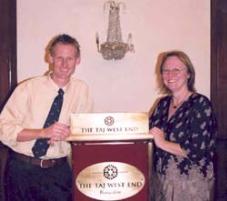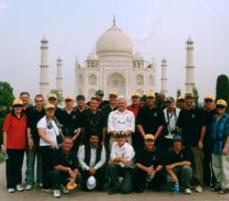Indian cricket tour provides lively pitch for engineering education
Published on 18 May, 2004
Combining a universities delegation and a cricket tour to India has created dialogue and potential for interaction on engineering education projects.
An initiative of the Queensland Government saw a group of academic researchers representing various Queensland universities travel to Sri Lanka and India for a combined academic and cricket tour to showcase Queensland capability.
But the challenges of finding common ground between India’s sprawling education system and Australia’s more tightly wound model are significant.
 That is according to Professor Elizabeth Taylor, AO, who represented engineering education on the 13-member Queensland universities delegation presenting research from politics to biotechnology to social science to IT.
That is according to Professor Elizabeth Taylor, AO, who represented engineering education on the 13-member Queensland universities delegation presenting research from politics to biotechnology to social science to IT.
Professor Taylor said the presence of legendary batsman Allan Border in the parallel cricket tour group had opened many doors in India.
“Allan was treated like a hero , and the university people were also very well looked after along the way,” she said.
“It was a protocol-driven tour, with presentations, speeches and formal events which are culturally very different to our more relaxed style. However the interaction with our Indian university counterparts was very positive and fruitful.”.
Professor Taylor, who is Dean of Central Queensland University’s James Goldston Faculty of Engineering and Physical Systems, said the scope and complexity of India’s education landscape made comparison of quality systems very difficult.
She noted that many Indian universities had cohorts around 350,000 spread throughout dozens of colleges with varying standards of governance and management.
“I was struck by the different scale when someone complained that only 1400 physics students had enrolled at a particular institution this year. That such a number is considered a problem is mind-blowing in our context here. Indian universities have a respected tradition of academic excellence and it is important that we approach our relationships as equal partners who believe that there is much we can learn from each other, especially through collaboration.".
“We made some important contacts and networks and the dialogue and understanding levels will benefit. We made some strategic links with some of the better universities who are really looking for partnerships. The important step will be building the relationships commenced on the tour. ”.
 Professor Taylor said she spoke about the need for universities to practice what they preached when delivering engineering education.
Professor Taylor said she spoke about the need for universities to practice what they preached when delivering engineering education.
“We need to find the organisational structure that gets academics talking and enables them to aim for new shared visions, rather than just teaching around what their research interests are. If we’re teaching project management and on-time on-budget then our structures need to support these goals.”.
Professor Taylor said her tour memories included the stark contrast between the lush grounds of the cricket ovals and hotels and the dusty landscapes elsewhere , the magnificance of the architecture and the hospitality of the people.
The tour itinerary included Colombo in Sri Lanka and Chennai, Mumbai, Pune, Bangalore and Delhi in India. ENDS Photos: Professor Taylor found time for sightseeing (above to the right) and was photographed with cricket team member and CQU alumnus Paul Cochrane at one of the tour hotels.

